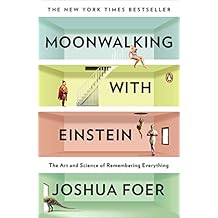Moonwalking with Einstein - Joshua Foer

Rating 10/10
My Summary:
The author gets obsessed with the world of memory, following memory champions and learning their tools and tricks. In the process he takes it upon himself to join their ranks. It is satisfying that wrote memory is something that anyone can train, but the techniques don’t seem to transfer to other walks off like. The ability to memorize the order of a deck of cards does little to improve ones associative mind.
Quotes:
Imagine waking up tomorrow and discovering that all the worlds ink had become invisible and all our bytes had disappeared. Our world would immediately crumble. Literature, music, law, politics, science, math: Our culture is an edifice built of externalized memories.
One thing is clear, however: The nonlinear associative nature of our brains makes it impossible for us to consciously search our memories in an orderly way. A memory only pops directly into consciousness if it is cued by some other thought or perception some other node in the nearly limitless interconnected web.
Perhaps, as Borges concludes in his story, it is forgetting, not remembering, that is the essence of what makes us human. To make sense of the world, we must filter it. To think, Borges writes, is to forget.
In ways as obscure as sexing chickens and as profound as diagnosing an illness, who we are and what we do is fundamentally a function of what we remember.
The brain is a costly organ. Though it accounts for only 2 percent of the body’s mass, it uses up a fifth of all the oxygen we breathe, and its where a quarter of all our glucose gets burned.
Forgotten phone numbers and birthdays represent minor erosions of our everyday memory, but they are part of a much larger story of how we’ve supplanted our own natural memory with a vast superstructure of technological crutches from the alphabet to the BlackBerry. These technologies of storing information outside our minds have helped make our modern world possible, but they’ve also changed how we think and how we use our brains.
Michel de Montaigne expressed the dilemma of extensive reading in the sixteenth century: I leaf through books, I do not study them, he wrote. What I retain of them is something I no longer recognize as anyone else’s. It is only the material from which my judgment has profited, and the thoughts and ideas with which it has become imbued; the author, the place, the words, and other circumstances, I immediately forget. He goes on to explain how to compensate a little for the treachery and weakness of my memory, he adopted the habit of writing in the back of every book a short critical judgment, so as to have at least some general idea of what the tome was about and what he thought of it.
It was easy enough to explain to people that I was living with my parents to save a few bucks while I cut my teeth as a writer. But what I was doing in their basement, with pages of random numbers taped to the walls and old high school yearbooks (purchased at flea markets) cracked open on the floor, was, if not downright shameful, at least something to lie about.
The more we remember, the better we are at processing the world. And the better we are at processing the world, the more we can remember about it.
Header photo © medium.com
Body photo © amazon.com